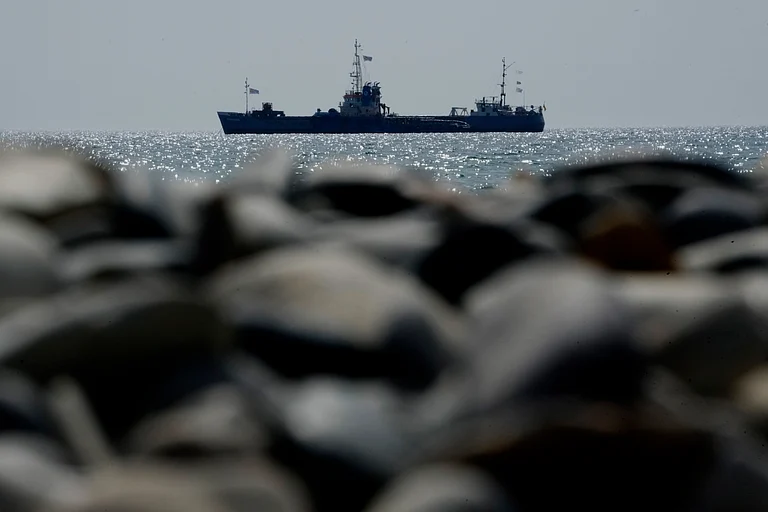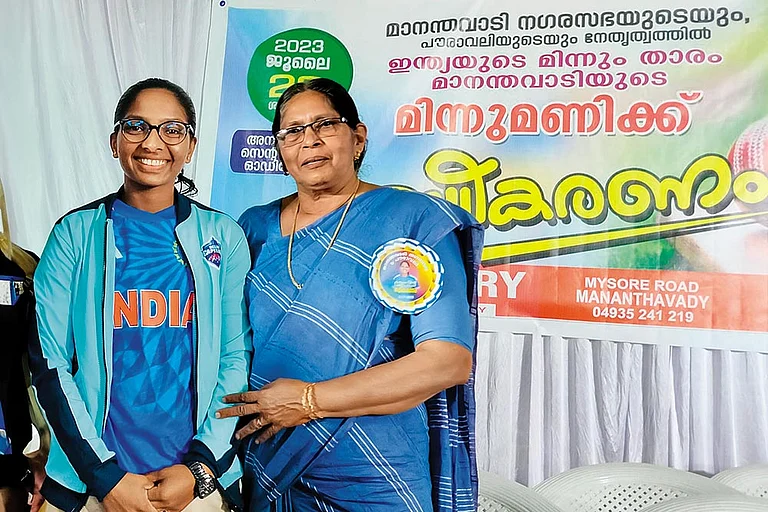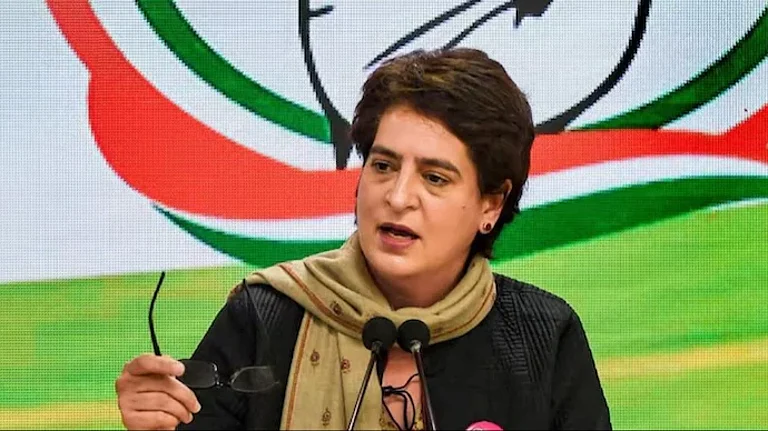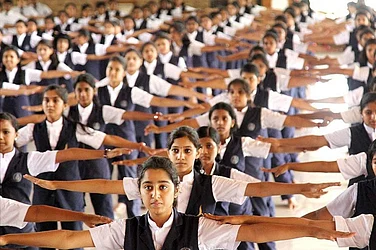The misty mountains of Wayanad remain drenched in a relentless downpour as if the skies themselves mourn the tragedy. The rain continues unabated on the third day following the devastating landslides, adding to the heavy, sorrowful atmosphere hanging over the region. The search for intact bodies has nearly come to a standstill; now, rescue workers grapple with the heartwrenching task of recovering scattered fragments of the deceased.
After 72 agonising hours, the chance of finding the remains of the hundreds still missing is growing dim. Human beings have been reduced to tatters, wrapped sombrely in sheets. The Family Health Centre in Meppadi, converted into a makeshift morgue, is thick with the acrid smell of formalin used to preserve the mortal remains of the victims and that of lime, scattered on the slippery floors to absorb moisture.
The survivors, bereft of their loved ones, recount their harrowing tales repeatedly to journalists, officials and volunteers visiting the relief camps. Their voices are hollow and mechanical as they list the names of the missing to those trying to piece together the full extent of the tragedy. They seem drained as if every tear has been exhausted. At the Family Health Centre and the community hall, where they wait to identify the remains of their dear ones, an unsettling silence prevails. There are no outbursts of grief, not even whispers, but just a heavy, oppressive quiet that hangs in the air.
Amidst the weight of the tragedy, Wayanad displays an unparalleled strength of resilience, bolstered by the efforts of hundreds of volunteers who have come from all corners of the state. Kerala has a rich tradition of volunteerism, with people from all walks of life coming together to support one another in times of tragedy. Time and again, the state has demonstrated its ability to set aside religious and political divides to unite in times of crisis. This has been evident during the 2018 flood, Covid-19 and every landslide since then.
In Wayanad, too, this spirit is strikingly evident as political and ideological opponents come together and work in unison during the ongoing relief and rescue operations.
Volunteers, clad in raincoats over T-shirts that display their organisational affiliations, are tirelessly involved in various critical tasks – regulating traffic, distributing essentials, searching for bodies, driving ambulances and cleaning debris-soaked remains. They are organised into groups, each assigned specific duties ranging from easing ambulance access through traffic to the challenging and sensitive task of cleaning and handling the remains of the deceased. These volunteers come from a wide range of groups, including both political and non-political youth organisations, local clubs and religious groups. The collaboration between DYFI and Sevabharati (a voluntary organisation associated with the RSS) working side by side is a rare sight typically seen only during times of calamity. In peacetime, these groups prefer to engage in political conflicts but their differences are set aside at the phase of a tragedy.
Counting the organisations involved in rescue and relief would be a tiring task. The volunteers’ T-shirts carry badges of DYFI, AIYF, Youth Congress, Seva Bharati, SKSSF (Samasta Kerala Sunni Students Federation), SYS (Sunni Yuvajana Samgam), People’s Democratic Party (a regional political party), Welfare Party (the political outfit of Jamaathe Islami), Ideal Relief Wing (an independent NGO focusing on rescue and relief) and more. There are hundreds who have no organisational affiliations as well.
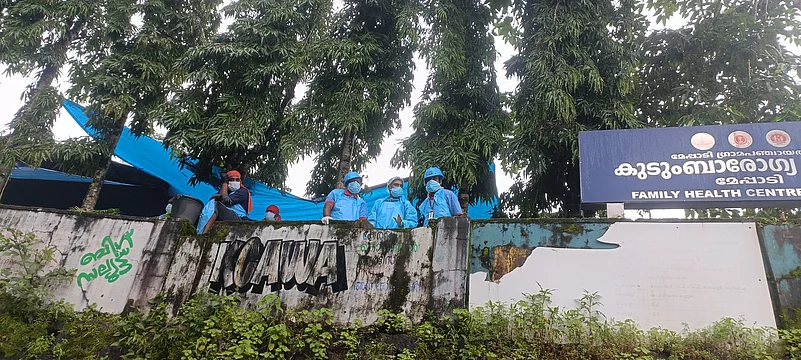
Despite working tirelessly for the past 72 hours, the volunteers still feel their hearts sink when recovering and cleaning the bodies of children. "I found the body of a baby wrapped in a woollen cloth. The clothing, likely put on by the child's mother, remained intact. My grandchild is the same age, and we wrap him in similar clothes," says Unais, a volunteer from SYS, the youth wing of Samastha Kerala Jem Iyyathul Ulema, a prominent Sunni organisation in Kerala.
Ali, a volunteer from PDP, a regional political party, shares an even more disheartening story. "When I entered a broken house, I found no one inside, just a collection of trophies and certificates. They belonged to a girl and were awards she had received for excellent marks and achievements in extracurricular activities. I don’t know who she was, but I understand that the entire family who lived there was washed away."
Ali, Unais and Hussain, each from different and rival organisations, were standing together at the entrance of the road leading to the Family Health Centre and Relief Camp. They were distributing masks to everyone who entered and regulating traffic to ensure the swift movement of ambulances.
Rakesh, a headload worker from Kannur, reached Wayanad on July 30. He also drives the ambulance owned by the local unit of DYFI in his locality. Rakesh and Amal, both volunteers of DYFI, have been running the ambulance from the landslide site to hospitals and back without a break for two days. “It is hard to withstand witnessing the grieving family members struggling hard to identify the bodies. They examine the body to find some marks that they are familiar with,” says Rakesh. The volunteers of political arch-rivals RSS and CPIM go hand in hand in the land of disaster. “We go in complete cooperation with the volunteers of Seva Bharati (RSS), SKSSF, Youth Congress and all. This is not the time to express differences,” he adds.
Ashif and Nijas, volunteers from the Youth Congress, have been assisting with burials at nearby mosques. "We help carry the bodies after inquest and identification to the mosques," they explained as they hurried to accompany an ambulance departing for the burial of a man. Rejish, the volunteer of Seva Bharati (RSS) also does the same. “We assist the identified bodies to cremate as per Hindu rituals,” he says.

Sakkeena, a volunteer from IRW (Ideal Relief Wing), an independent NGO focused solely on rescue and relief, hails from Kozhikode. She and her team are engaged in cleaning the bodies of women. Sakkeena stays in the inquest room, waiting for the bodies to arrive after the inquest procedure. She reached Wayanad on the morning of August 2 and by the afternoon had cleaned nine bodies. After 72 hours since the disaster, handling the bodies has become increasingly difficult. "They are not in good shape. Most of the bodies are deeply soaked in mud, we have to be very careful while cleaning," she said. Sakkeena could not leave for Wayanad on the day of the disaster because she was busy in her village, helping people move to safer places. Due to heavy rains in North Kerala, several areas in Kozhikode and other northern districts have been inundated. Around fifty women volunteers from IRW are active in different localities in Wayanad, according to Sakkeena.
Shanoob and Noufal, workers of the Welfare Party (the political wing of Jamaat-e-Islami), have been tasked with cleaning bodies and assisting grieving families in the painful process of identifying them. Shanoob was shaken when a two-year-old girl was identified by her family members only by the henna design on her tender feet. Shanoob, an auto driver, and Noufal, an instrumentation engineer, recalled that this had been the most chilling experience they had encountered since they began rescue and relief work in calamities. Shanoob has been active in volunteer work since the 2018 floods and continued his efforts during the COVID-19 pandemic, the 2021 landslide in Pettimudi in Idukki, and the 2019 landslides in Malappuram and Wayanad.
All the volunteers have received systematic training in rescue operations from their respective organisations. This culture of volunteerism has been strengthened since the 2018 floods. Those who initially came out of their homes to support people in distress have continued their efforts ever since. Kerala has faced consecutive calamities, including the Nipah virus outbreak, the COVID-19 pandemic and massive landslides in the following years.
In response to the overwhelming support, the Kerala government established a 'Social Volunteer Force' in 2020. A new directorate was created under the Department of General Administration, headed by an IAS officer. Additionally, a website called the 'Sannadham Portal' was launched to facilitate volunteer registration, which has proven invaluable during times of disaster. Registered volunteers are deployed to different localities to assist local administration, police, and fire and safety officials as needed. Political affiliations do not hinder people from joining this government-led volunteer force. Most of the volunteers we met in Wayanad, regardless of their political backgrounds, are registered members of the Social Volunteer Force. So far, there are three-and-a-half lakh volunteers registered under the state-run force.
Amidst the grim stories emerging from devastated Wayanad, tales of unmatched resilience highlight Kerala's remarkable strength in facing calamities. The extraordinary unity displayed by the people since the 2018 floods is phenomenal. Social media is filled with images of collection centres, truckloads of supplies arriving in Wayanad from all over the state, and stories of small-time vendors donating their entire stock to aid efforts. Stories of breastfeeding mothers willing to nurse babies in relief camps have gone viral on social media. Bhavana and Sajin, one such couple from Idukki, travelled to Wayanad specifically to help feed infants in need. Sajin is a driver, and Bhavana, the mother of an infant, is a homemaker with no personal income. Hence, both of them have chosen this way to support the victims of the tragedy.
Unfaltering resilience is the only way forward to overcome a disaster, and the people of Kerala have demonstrated this multiple times.







